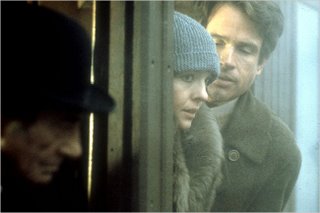
Coming in two weeks: Reds on DVD. Original content coming soon, to this blog, too.
Film on a Revolution Was a Revolution Itself
By A.O. SCOTT
Published: October 4, 2006
“What kind of lunatic would make a movie like this and ask someone to invest in it?” asked Warren Beatty, reached by telephone recently at his home in Los Angeles. It was a rhetorical question, since the movie he was talking about was “Reds,” the three-and-a-half-hour historical epic he wrote (with Trevor Griffiths), directed and starred in 25 years ago.
The point he was making had less to do with his own sanity than with the movie business, which he is not alone in believing to be far more risk-averse — and less willing to spend money on the potential follies of ambitious directors — than it was back then, when Paramount put up the money for “Reds.” Large-scale costume dramas are still undertaken from time to time, but the scope, the seriousness and the subject matter of “Reds,” which immerses the audience in the factionalism of the early-20th-century American left, as well as in the spectacle of the Bolshevik Revolution and the love lives of obscure intellectuals, make it unusual.
To revisit the film — it will be shown tonight at the New York Film Festival in advance of its DVD release on Oct. 17 (and for one week, starting Friday, at the Village East Cinemas in Manhattan) — is to acknowledge that they don’t make them like that anymore, and that they didn’t make very many even when they did. According to Mr. Beatty, “Reds” was the last Hollywood picture to be released with an intermission, and it does, in retrospect, seem to come at the end of a line of grand, sometimes grandiose movies that stretches back from the “Godfather” series, through “Lawrence of Arabia,” to “Gone With the Wind.”
“Reds” was generally admired when it first came out. The New York Film Critics Circle named it the best picture of 1981, and it was nominated for 12 Oscars, winning three (best supporting actress for Maureen Stapleton, best cinematography for Vittorio Storaro and best director for Mr. Beatty).
Though it has not previously been available on DVD, a format to which its director is a recent convert, the movie has not really been forgotten, either. It features Mr. Beatty in an especially dashing performance, playing the radical journalist John Reed, and Diane Keaton in top form — sexy, unpredictable, quick-witted and tough — as Louise Bryant, Reed’s colleague, comrade and wife. Jack Nicholson, in one of his last entirely un-self-conscious performances, plays Eugene O’Neill, and Ms. Stapleton steals a handful of scenes as the indomitable Emma Goldman.
“Reds” remains a superior history lesson, thanks to Mr. Beatty’s thorough command of the material and to his inclusion of real-life “witnesses” to the life and times of Reed. Their faces and voices give this romance some documentary ballast, and make it, now that they are gone, a moving archive of faded memories.
Curiously, though, the movie may be less nostalgic now than it was in 1981. You might think the opposite, given the inglorious expiration of the Soviet Union, the founding of which feeds the idealism of the film’s main characters (who do, it should be noted, express some misgivings at the authoritarian and antidemocratic tendencies evident within the revolution, even in its early days). The strains of “The Internationale” do not set many pulses racing nowadays. But the dwindling of the socialist cause may also make it possible to look at “Reds” with fresh eyes, and to feel the nearness of the long-ago story it tells.
“I’d say it’s infinitely more accessible now,” Mr. Beatty said. He recently attended a screening held by the Directors Guild in Los Angeles, and was startled by the intensity of the response. “The resonance to the film now was 180 degrees different from then,” he said. “The receptivity to the jokes of the old people, to John Reed, to the speeches he makes, is much greater now.”
And the reason for this, he believes, is that “Reds” is, in large part, a movie about American politics during wartime, and about the opposition to American hegemony at an earlier stage of its development. The fact that Reed, Bryant and their allies initially come together in opposition to American involvement in World War I — a war whose motive Reed succinctly identifies as “profit” — is something current audiences are likely to notice, and perhaps be provoked by. But in 1981, Mr. Beatty noted, “this movie was so harmless that Ron and Nancy Reagan, who I always considered friends, arranged a screening in the White House.”
A return engagement seems unlikely, for any number of reasons. But Mr. Beatty, who declined to speak to the American press when “Reds” came out, and who agreed to be interviewed for the making-of documentary that is one of the DVD’s extra features, regards his movie with renewed zeal.
“I’m looking at this,” Mr. Beatty said, “and it seemed to me — you know how if you hold a picture for seven months, everyone starts saying it must be in trouble? What if I’d said ‘I want to hold this for 25 years?’ ”

No comments:
Post a Comment